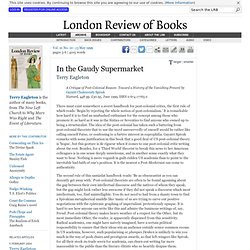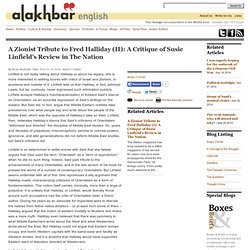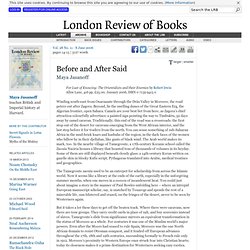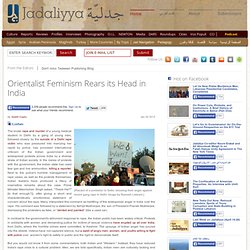

Under%20wstrn%20eyes. Freedom in Three Acts: @Koinon3a. Guest post by @KOINON3A New Friends Colony Park, 1996.

There’s a funny telepathy between people running or walking in opposite directions along a narrow jogging track. You both move to one side to avoid bumping into the other, only to find that the other person has moved in exactly the same direction you have. We exchanged half smiles at this long before we actually collided. Terry Eagleton reviews ‘A Critique of Post-Colonial Reason’ by Gayatri Chakravorty Spivak · LRB 13 May 1999. There must exist somewhere a secret handbook for post-colonial critics, the first rule of which reads: ‘Begin by rejecting the whole notion of post-colonialism.’

It is remarkable how hard it is to find an unabashed enthusiast for the concept among those who promote it: as hard as it was in the Sixties or Seventies to find anyone who owned up to being a structuralist. The idea of the post-colonial has taken such a battering from post-colonial theorists that to use the word unreservedly of oneself would be rather like calling oneself Fatso, or confessing to a furtive interest in coprophilia. Gayatri Spivak remarks with some justification in this book that a good deal of US post-colonial theory is ‘bogus’, but this gesture is de rigueur when it comes to one post-colonial critic writing about the rest.
Besides, for a ‘Third World’ theorist to break this news to her American colleagues is in one sense deeply unwelcome, and in another sense exactly what they want to hear. Kate Durbin Finds Virtual Moments of Adolescent Vulnerability in “Girls, Online” Kate Durbin (Image via wikipedia.org) Artist and writer Kate Durbin is both a scavenger and connoisseur of the internet.

She prowls the immaterial space, searching for images that express the emotional lives of adolescent girls. It was on Facebook that I first noticed a link to Durbin’s project “Girls, Online,” a collection of anonymous Tumblr posts from teenage girls that she assembled for Chris Higgs’s website Bright Stupid Confetti. Durbin captures the blogs and reblogs of sensitive adolescent teens and tweens, women-born-women, trans bois, and gay boys. A Zionist Tribute to Fred Halliday (II): A Critique of Susie Linfield’s Review in The Nation. Linfield is not really talking about Halliday or about his legacy; she is more interested in settling scores with critics of Israel and Zionism, in academe and outside of it.

Linfield tells us that Halliday, in fact, admired Lewis, but he, curiously, never expressed such admiration publicly. Linfield accepts Halliday’s mischaracterization of Edward Said’s stance on Orientalism, as an accurate expression of Said’s writings on the subject. But Said did, in fact, argue that Middle Eastern realities take precedence over what people say and write about the people of the Middle East, which was the opposite of Halliday’s take on Said. Linfield, then, reiterates Halliday’s stance that Said’s criticisms of Orientalism “deformed and diverted” the discipline of Middle East studies. Maya Jasanoff reviews ‘For Lust of Knowing’ by Robert Irwin · LRB 8 June 2006.
Winding south-east from Ouarzazate through the Drâa Valley in Morocco, the road peters out after Zagora.

Beyond, lie the swelling dunes of the Great Eastern Erg, the Algerian frontier, open Sahara. Camels are your best bet from here, as Zagora’s chief attraction colourfully advertises: a painted sign pointing the way to Timbuktu, 52 days away by camel caravan. Traditionally, this end of the road was a crossroads: the first stop out of the desert for caravans emerging from the West African interior, and the last stop before it for traders from the north.
You can sense something of sub-Saharan Africa in the mud-brick ksars and kasbahs of the region; in the dark faces of the women who billow by in their djellabas, like gusts of black wind. Pussy Riot Closing Statements. Read the translators’ statements here.

On August 8th, the three members of Russian feminist punk band Pussy Riot delivered their closing statements at the Moscow Khamovniki District Court. Charged with “hooliganism motivated by religious hatred,” Maria Alyokhina, Yekaterina Samutsevich, and Nadezhda Tolokonnikova were first arrested on March 3, a day before the controversial re-election of Vladimir Putin. Meanwhile, they had committed their crime on February 21, when five members of Pussy Riot staged a guerrilla performance on the altar of the Cathedral of Christ the Savior in Moscow. For less than a minute, the women danced, singing “Our Lady, Chase Putin Out!” And crossing themselves until they were apprehended by security guards. Reading Racism Right to Left: Reflections on a Powerful Word and Its Applications.
When I was younger, I was a really good speller.

Not like those lovably geeky kids at the National Spelling Bee, but good nonetheless. I always got 100s on my spelling tests, and when it came to in-class competitions, I’d usually win. But then came that awful day in sixth grade—a day that, I'm embarrassed to admit I still recall clearly—when I was eliminated in the first round of the spelling bee in my own homeroom class. It wasn't that I couldn't spell the word about which I was being quizzed. The Burka Avenger versus liberal patriarchy. The reason patriarchy is wrong is because it interferes with a woman’s choice.

PHOTO: PUBLICITY If you live under a rock and are still unaware of the phenomenon that is the “Burka Avenger”, please check it out. The cartoon series is the story of a teacher, Jiya, who dons a stylised burka costume, becoming a super-heroine. Using her martial arts skills, the Burka Avenger fights evil, mainly to defend her students and the school she teaches at, from patriarchal goons who want to shut the school down.
Elizabeth Wurtzel Confronts Her One-Night Stand of a Life. I am so done with 2012.

What a wretched year it was. Last winter, I was living in the parlor floor of a nineteenth-century walk-up on Bleecker Street with thirteen-foot ceilings and two fireplaces and a tarp deck that stretched out like a backyard, with pottery planters of ferns and geraniums and a wood fence around it. Despite all the chipped paint and disrepair that approximated charm in the floor-through apartment, I would have been happy if the previous tenant, from whom I was subletting, had not turned into a stalker. Against Redemptive Masculinity. Anthropology News. Orientalist Feminism Rears its Head in India. The brutal rape and murder of a young medical student in Delhi by a gang of young men, followed closely by the suicide of a Delhi rape victim who was pressured into marrying her rapist by police, has provoked international criticism of the Indian government and widespread protests across India by a diverse strata of Indian society.

In the melee of protests with the government, the Indian state has used tear gas and live ammunition, killing a reporter. Next to the police's horrible management of rape cases, as well as the protests themselves, Indian leaders have produced a litany of insensitive remarks about the case. Prime Minister Manmohan Singh asked, "Theek Hai? " [Is that enough?]) COVER STORY: Archipelago of injustices. ON March 21, 2012, Shaima Alawadi, a 32-year-old Iraqi woman, was fatally beaten with a tire iron in Southern California. A note found near her said, “This is my country. Go back to yours, terrorist.” The investigators asserted that it was an isolated incident and that other Iraqis need not worry. Lumping disparate peoples into threats and describing violence against them as “isolated incidents” works in tandem.
The former justifies sustained violence and the latter diverts our attention from the systemic nature of this violence. Alia Malek’s work of oral history, Patriot Acts: Narratives of Post-9/11 Injustice, gives the lie to the frame — isolated incident — that holds within it the image of the idyllic American society as it effaces its systematic injustices.
By including the violated as victims of isolated crimes, this frame excludes the chorus of their voices. Surveys have also shown a lack of response from teachers and school administration. The Varieties of Blackness. Chimamanda Ngozi Adichie knows what she knows, and also what she does not. When I asked her a question which she didn’t like, she would tell me so, gently but firmly: “I don’t know what that means,” she said, several times, and then proceeded to turn to subjects she preferred. <article-title>Orientalism</article-title> <contrib-group><contrib> <name name-style="western" index="Said, Edward"> <given-names>Edward</given-names> <surname>Said</surname> </name> </contrib></contr. Black in Time.
Long Division Kiese Laymon Agate/Bolden, $15 (paper) “American history is longer, larger, more various, more beautiful, and more terrible than anything anyone has ever said about it,” wrote James Baldwin in The Fire Next Time. Kiese Laymon’s new debut novel, Long Division, proves Baldwin’s point. Playing with time in an act of historical interrogation, the novel rejects static racial inequity and straightforward progress alike, expressing all along a deep dissatisfaction with the supposed triumph of multiculturalism today. In a multilayered, allusion-packed, time-traveling plot set in Mississippi, Long Division takes us, nesting-doll-style, from 2013 to 1985, 1964, and back, engaging complex questions of race, violence, gender, sexuality, and our relationship to history. More than anything, Laymon shows with surprising lucidity how American racialized inequality is persistent but mutable, that the past is not the present, but isn’t, either, entirely past.
Baheeg, Teer Enta. Reclamations - Current Issue. Issue 3 (December 2010) Political Work with Women and as Women in the Present Conditions: Interview with Silvia Federici Maya Gonzalez and Caitlin Manning (1) Maya Gonzalez and Caitlin Manning: You have written about university struggles in the context of neo-liberal restructuring. Seema Jilani: My Racist Encounter at the White House Correspondents' Dinner. Border choreography, bare bodies, and penal states. A feast of form in my twitter-stream today. [ by Charles Cameron -- forms & patterns, pattern recognition & creative leaps, creative leaps & connecting dots, connecting dots & node-and-edge mapping -- node-and-edge mapping, link charts and Sembl-HipBone games ] .
There’s no “actionable intelligence” in that tweet, but it recognizes a pattern, it makes a fine creative leap. And given the chance, that’s something bright minds do naturally, and enjoy doing, and is away more important than we think. Yestedrday I was watching Manhunt pretty closely for an upcoming Zenpundit review, and noticed that some of the most significant quotes in the film were absent from CNN’s transcript.
One gap I noticed had to do with the descriptions of the analytic process, and in particular some of the things Cindy Storer said. I’ll quote this one, which goes to the heart of the matter, but there’s plenty more left for me to chew over with you later. Seeing connections — connecting the dots — happens in lines and leaps. That’s the 1% we call inspiration. Saudi Arabia Domestic Violence Ad. The Kingdom of Saudi Arabia will reportedly see its first-ever anti-domestic violence advertisement, which is intended to encourage women to report abuse. The ad is part of the No More Abuse campaign, begun by the country’s King Khalid Foundation.
According to the No More Abuse site, “The phenomenon of battered women in Saudi Arabia is much greater than is apparent on the surface,” it says. “It is a phenomenon found in the dark. We want to achieve justice for all women and children exposed to abuse in all parts of the Kingdom.” It’s a watershed moment for the nation, which is known for its gender inequalities. In fact, Saudi authorities use SMS to keep tabs on female citizens and report their whereabouts to their guardians. Rates of abuse are difficult to determine in the country, because much like the U.S. or other countries, domestic violence often goes unreported. What effect these ads will have on Saudi women is yet to be determined. Susan Faludi: How Shulamith Firestone Shaped Feminism. Sunday Reading. Put Your Shirts Back On, Ladies - By Naheed Mustafa. On the Nature of Gaffes. Protecting White Kids From History. Femen's Neocolonial Feminism: When Nudity Becomes a Uniform. International Boulevard - The Fast-Food Feminism of the Topless Femen.
Wild Girls Wicked Words. Women in Paris finally allowed to wear trousers. Themes... Can watching a couple of Rihanna videos really turn a girl into a knicker-dropping strumpet? 'Racism' of early colour photography explored in art exhibition. Tiqqun #2, “Sonogram of a Potential” « caring labor: an archive. Can non-Europeans think? - Opinion. Can the Subaltern Draw?: Reframing Caste in Indian Graphic Novels.